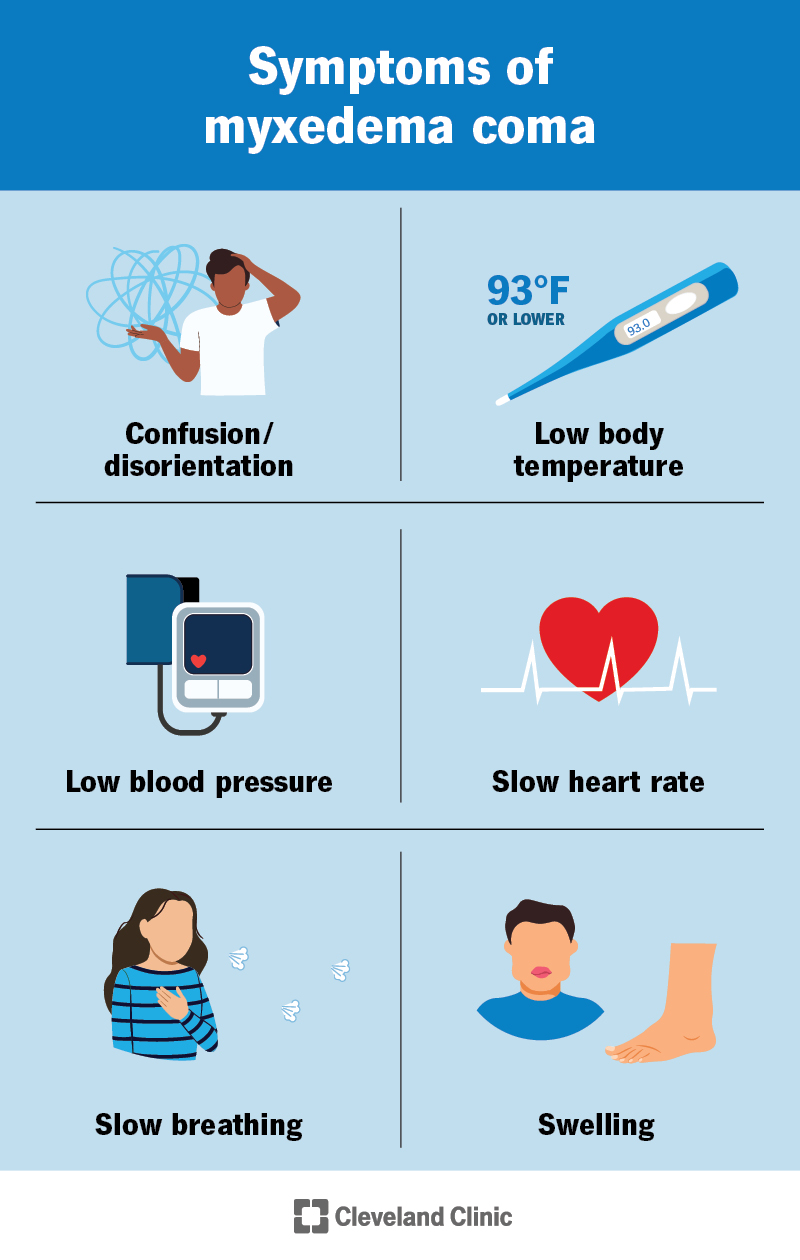Myxedema coma is a rare, life-threatening complication of hypothyroidism. It happens when your body doesn’t produce enough thyroid hormones for several years. It can also happen when hypothyroidism isn’t well-managed. This leads to symptoms like slow heart rate, low blood pressure and confusion. It’s a medical emergency.
Advertisement
Cleveland Clinic is a non-profit academic medical center. Advertising on our site helps support our mission. We do not endorse non-Cleveland Clinic products or services. Policy
A myxedema coma is a serious complication of severe hypothyroidism. You can have symptoms like a slow heart rate, hypothermia and confusion due to your organs shutting down. It happens when you have extremely low thyroid hormone levels.
Advertisement
Cleveland Clinic is a non-profit academic medical center. Advertising on our site helps support our mission. We do not endorse non-Cleveland Clinic products or services. Policy
Despite the name, you may not go into a coma. This is why some healthcare providers call it a myxedema crisis. It’s a rare, but life-threatening condition.
Myxedema crisis needs immediate medical care in the intensive care unit (ICU). If a friend or loved one has hypothyroidism, watch for symptoms and call your emergency services number right away.

Image content: This image is available to view online.
View image online (https://my.clevelandclinic.org/-/scassets/images/org/health/articles/myxedema-coma)
Some of the symptoms of this condition are:
Myxedema coma is a medical emergency. You can lose consciousness, and your organs may begin to shut down. Without quick treatment, it can lead to respiratory failure or death.
The most common cause is not receiving treatment for hypothyroidism — usually for a long period of time. This could be because you don’t know you have it or it’s not well-managed.
Severe hypothyroidism deprives your body of thyroid hormone. You need this hormone to run your metabolism, heart, muscles, brain — almost every body system you have. Without thyroid hormone, your body will start to shut down.
There are some known triggers of myxedema coma for people with hypothyroidism:
Advertisement
The biggest risk factor for a myxedema crisis is having a long history of untreated hypothyroidism. Other risk factors include:
If you’re receiving treatment for a thyroid condition, regular checkups with your provider are important. They help make sure your treatment is working.
Healthcare providers can diagnose it based on your symptoms, a physical exam and your health history. They may ask if you have a history of thyroid disorders, thyroid surgery or if you are taking thyroid medications. If you’re confused, it might be hard to share information. So, healthcare providers may have to diagnose you based on your symptoms and a physical exam.
Since it’s a medical emergency, you’ll most likely go to the ICU for immediate treatment. They’ll use blood tests to confirm low thyroid hormone levels.
Your provider may order other tests like:
Treatment for myxedema crisis typically takes place in an ICU where your healthcare team will monitor you closely. You’ll receive:
Seek medical care right away if you believe your loved one is having a myxedema crisis. Symptoms could include confusion, swelling and shallow breathing.
If you have hypothyroidism, be sure to take your medication exactly as it’s prescribed. Attend all your appointments with your healthcare provider. They’ll run tests on your thyroid hormone levels to make sure you’re taking the right dose.
Myxedema coma is a serious condition that can turn fatal. Your healthcare team will need to recognize and treat it quickly. When this happens, the outcome is usually better. Even so, myxedema coma is fatal for about 2 to 6 out of 10 people.
Advertisement
Recovering from a myxedema coma can take days or weeks (depending on how severe your condition is). Be patient with yourself as you recover. Your body has gone through a lot. You’ll need to take thyroid medication for the rest of your life and have frequent checkups with your healthcare provider.
The best way to prevent the condition is to get treatment for hypothyroidism. Visit your healthcare provider for checkups and take your thyroid medication as directed. This can prevent you from dangerously low thyroid hormone levels that can lead to myxedema crisis.
Telling your friends and family about the warning signs of myxedema coma is also a great prevention step to take. This can be beneficial if you become unconscious or have severe symptoms of the condition.
Myxedema coma is a scary complication of untreated hypothyroidism. Recognizing the signs and getting medical attention right away can make a huge difference. Taking medication for hypothyroidism and visiting your doctor regularly can prevent a myxedema coma. If you’ve survived a myxedema crisis, it’s normal to have lots of emotions and questions about what happened to you. Share these with your healthcare team so they can help support you.
Advertisement

Sign up for our Health Essentials emails for expert guidance on nutrition, fitness, sleep, skin care and more.
Learn more about the Health Library and our editorial process.
Cleveland Clinic’s health articles are based on evidence-backed information and review by medical professionals to ensure accuracy, reliability and up-to-date clinical standards.
Cleveland Clinic’s health articles are based on evidence-backed information and review by medical professionals to ensure accuracy, reliability and up-to-date clinical standards.
Cleveland Clinic’s experienced healthcare providers treat all kinds of thyroid disorders, including issues that cause hypothyroidism and hyperthyroidism.
